初中9年级英语上知识点
九年级上册英语全部知识点

九年级上册英语全部知识点Unit 1: Greetings and Introductions- Greetings: Hello, Hi, Good morning/afternoon/evening- Introducing oneself: My name is..., I am..., Nice to meet you- Asking for others' names: What's your name? Could you tell me your name, please?- Saying goodbye: Goodbye, Bye, See you laterUnit 2: School Life- Classroom objects: desk, chair, board, computer, book- School subjects: English, Math, Science, History, Geography- Talking about schedules: What classes do you have on Mondays? My first class is English.- Talking about preferences: I like English, I don't like Math.Unit 3: Daily Routine- Expressing daily activities: I get up at 7 o'clock. I have breakfast at 7:30.- Using time expressions: in the morning, in the afternoon, in the evening- Talking about frequency: I usually brush my teeth twice a day.Unit 4: Hobbies and Interests- Talking about hobbies: I like playing soccer, drawing, reading books.- Expressing preferences: I prefer playing video games to watching TV.- Inviting others: Do you want to play basketball with me?Unit 5: Family and Friends- Talking about family members: I have a brother and a sister. My mother is a teacher.- Describing physical appearance: My brother has short black hair and blue eyes.- Talking about relationships: She is my best friend. He is my cousin.Unit 6: Food and Health- Describing food: I like pizza with cheese and vegetables.- Talking about healthy habits: It's important to eat fruits and vegetables.- Expressing opinions: I think fast food is not good for our health.Unit 7: Travel and Holidays- Talking about vacation plans: I want to visit Paris during the summer vacation.- Asking for directions: Excuse me, could you tell me how to get to the train station?- Talking about past travels: Last year, I went to the beach with my family.Unit 8: Around the World- Talking about different countries: China, Italy, Australia, Japan- Describing famous landmarks: The Great Wall of China, The Colosseum, The Sydney Opera House- Comparing cultures: In China, people eat with chopsticks. In Italy, they eat pasta.Unit 9: Environmental Issues- Talking about environmental problems: pollution, deforestation, global warming- Expressing concerns: We need to recycle and reduce waste.- Talking about actions: We can use public transport instead of driving.Unit 10: Future Plans- Talking about future careers: I want to be a doctor and help people.- Expressing ambitions: I hope to travel around the world one day.- Talking about future plans: After graduation, I want to go to university.以上是九年级上册英语的全部知识点。
九年级上册英语语法知识点

九年级上册英语语法知识点1. 一般现在时 (Simple Present Tense)一般现在时用于表达现在的情况、习惯和常识。
例句:He goes to school every day.(他每天上学。
)2. 一般过去时 (Simple Past Tense)一般过去时用于表达过去发生的动作或状态。
例句:She played basketball yesterday.(她昨天打篮球。
)3. 一般将来时 (Simple Future Tense)一般将来时用于表达将来要发生的动作或状态。
例句:I will visit my grandparents next week.(下周我将去看望我的祖父母。
)4. 现在进行时 (Present Continuous Tense)现在进行时用于表达现在正在进行的动作。
例句:They are watching a movie now.(他们现在正在看电影。
)5. 过去进行时 (Past Continuous Tense)过去进行时用于表达过去某个时间正在进行的动作。
例句:She was studying when the phone rang.(电话响时她正在学习。
)6. 将来进行时 (Future Continuous Tense)将来进行时用于表达将来某个时间正在进行的动作。
例句:We will be having dinner at 7 o'clock tomorrow.(明天七点我们将在吃晚餐。
)7. 现在完成时 (Present Perfect Tense)现在完成时用于表达过去发生的动作对现在造成的影响。
例句:He has finished his homework.(他已经完成作业。
)8. 过去完成时 (Past Perfect Tense)过去完成时用于表达过去某个时间已经完成的动作。
例句:She had already left when I arrived.(我到达时她已经离开了。
译林版九年级英语上册语法知识点总结

译林版九年级英语上册语法知识点总结1. 时态1.1 一般现在时- 表示经常性或惯性的动作。
- 表示普遍真理或事实。
1.2 一般过去时- 表示过去发生的事情。
- 表示过去惯性的动作。
1.3 一般将来时- 表示将来会发生的事情。
- 表示将来计划或打算做的事情。
2. 语态2.1 被动语态- 表示动作的承受者。
- 结构:be + 过去分词。
3. 情态动词3.1 情态动词表能力- can, could3.2 情态动词表可能性- may, might, must, can't3.3 情态动词表建议- should, should've, would, would've4. 句子结构4.1 简单句- 包含一个主语和一个谓语。
4.2 复合句- 包含两个或两个以上的简单句。
- 连接词:and, but, or, because, so, if, unless等。
4.3 并列句- 两个或两个以上的句子用并列连词连接。
- 并列连词:and, but, or等。
5. 疑问句5.1 一般疑问句- 是否疑问句:Do, Does, Did + 主语 + 谓语。
- 特殊疑问句:What, How, Why, Who, When, Where等 + 主语 + 谓语。
5.2 选择疑问句- 提供两个或两个以上的选项。
- 结构:Do, Does, Did + 主语 + 谓语 + 选项。
5.3 否定疑问句- 在肯定句后加上否定词。
- 结构:Do, Does, Did + 主语 + 谓语 + 否定词。
6. 祈使句- 表示命令、请求或建议。
- 结构:动词原形 / 动词原形 + 宾语。
7. 代词7.1 人称代词- I, you, he, she, it, we, they。
7.2 物主代词- my, your, his, her, its, our, their。
7.3 反身代词- myself, yourself, himself等。
英语九年级上册一二单元知识点

《英语九年级上册一二单元知识点》一、词汇和短语1. 掌握单元主题相关的词汇和短语,包括描述人的形容词、名词和动词等。
2. 理解并使用常见的学科词汇,如科学、数学、历史等。
3. 学习并掌握与学校生活相关的短语和表达方式。
二、语法知识1. 掌握过去完成时态的使用方法及其相关的句型结构。
2. 学习并掌握宾语从句的用法,特别是与被动语态相关的宾语从句。
3. 学习并理解直接引语和间接引语之间的转换规则。
三、阅读技巧和策略1. 学习并掌握如何快速阅读,理解文章大意和主题思想。
2. 学习并掌握如何识别主题句和支撑句,理解文章结构。
3. 学习并掌握一些阅读技巧,如略读、扫读和预测等。
四、写作技巧和策略1. 学习并掌握如何组织写作结构,使其逻辑清晰、条理分明。
2. 学习并掌握如何使用连接词和短语,使文章流畅自然。
3. 练习写作与单元主题相关的短文,以提高写作能力。
五、口语表达技巧1. 学习并掌握与单元主题相关的日常会话用语。
2. 练习用英语描述学校生活和与人交往的经历,以提高口语表达能力。
3. 参与课堂上的口语活动,积极参与讨论,以提高口语交际能力。
六、文化知识拓展1. 学习并了解单元主题相关的英美文化背景知识。
2. 了解中西方文化差异,以更好地理解和运用英语。
3. 拓展与单元主题相关的文化知识,如学校生活、教育制度等。
总之,九年级上册一二单元是英语学习的重要阶段,需要学生掌握大量的词汇、语法、阅读、写作和口语技巧,同时也要了解相关的文化知识。
通过系统地学习和练习,学生可以更好地掌握英语,提高英语综合能力。
初中英语九年级上册必考知识点大汇总

初中英语九年级上册必考知识点大汇总Unit1 The Changing WorldTopic1 Our country has developed rapidly.【重点短语和句型】1. have a good summer holiday 暑假过得愉快2. come back from 从......回来3. have/has been to 去过4. have/has gone to 去了5. not...any more 再也不...6. take photos 照相7. by the way 顺便问一下8. take part in 参加9. around/all over/throughout the world 全世界10. tell sb. something about... 告诉某人关于某事11. have/live a happy/hard life 过着幸福/艰苦的生活12. describe...in detail 详细描述13. give support to 支持...14. see...oneself 亲眼看见15. keep in touch with 与...保持联系16. far away 遥远的17. kinds/sorts of 各种各样的...18. not only...but also 不仅...而且...19. make progress 取得进步20. more than/over 多于21. develop/improve rapidly 迅速发展/改善22. tell sb. (not ) to do sth. 告诉某人(别)做某事23. ask sb. (not ) to do sth. 要求某人(别)做某事24. in order to do sth. 为了做某事25. have to do sth. 不得不做某事26. It s +形容词+for sb. to do sth. 对于某人来说做某事是...的27. why not do sth. 为什么不做某事28. succeed/be successful in doing sth. 成功地做某事29. dream about doing sth. 梦想做某事30. see/hear sb. do/doing sth. 看见/听见某人做/正在做某事【重点语法】现在完成时一. 现在完成时的基本结构肯定句:主语+have/has+动词的过去分词+其他否定句:主语+have/has+not+动词的过去分词+其他一般疑问句:Have/Has+主语+动词的过去分词+其他特殊疑问句:特殊疑问词+一般疑问句(have/has+主语+过去分词+其他)二. 现在完成时的用法1. 现在完成时用来表示过去已经完成的动作对现在造成影响或后果。
九年级上册英语复习知识点
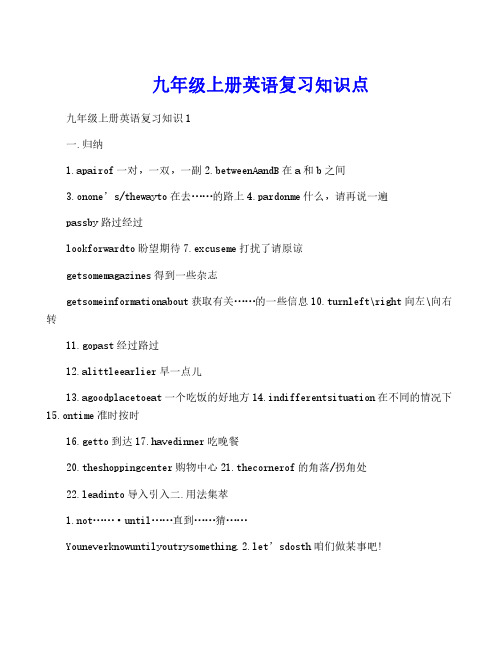
九年级上册英语复习知识点九年级上册英语复习知识1一.归纳1.apairof一对,一双,一副2.betweenAandB在a和b之间3.onone’s/thewayto在去……的路上4.pardonme什么,请再说一遍passby路过经过lookforwardto盼望期待7.excuseme打扰了请原谅getsomemagazines得到一些杂志getsomeinformationabout获取有关……的一些信息10.turnleft\right向左\向右转11.gopast经过路过12.alittleearlier早一点儿13.agoodplacetoeat一个吃饭的好地方14.indifferentsituation在不同的情况下15.ontime准时按时16.getto到达17.havedinner吃晚餐20.theshoppingcenter购物中心21.thecornerof的角落/拐角处22.leadinto导入引入二.用法集萃1.not……·until……直到……猜……Youneverknowuntilyoutrysomething.2.let’sdosth咱们做某事吧!3.spendtimedoingsth话费时间做某事4.thanksbfordoingsth为做某事而感谢某5.wouldliketodosth想要做某事lookforwardtodoingsth盼望做某事Itseems(that)…Itseemsarockbandplaysthereeveryevening.Couldyoupleasetellme...?Couldyoupleasetellmehowtogettothepostoffice?9.take的用法①takesomefoodtakesomemedicine(=have吃,喝)②takenotes做笔记③takeone’stemperature(测量)④Ittakessbsometime/moneytodosomething(花费,需要)⑤I’lltakethiscoat.(=buy购买)⑥takesomebody/somethingto(带领,拿去,取)⑦takeatraintoChongqing(乘坐)⑧takeoff(脱下)10.turn的用法turntopage80翻到Itisyourturn.轮到你了。
九年级英语上册笔记知识点

九年级英语上册笔记知识点一、Unit 1 How can we become good learners?1. 重点单词。
- aloud:出声地;大声地。
例如:read aloud大声朗读。
- pronunciation:发音;读音。
注意其动词形式是pronounce。
- patient:有耐心的;n.病人。
be patient with sb.对某人有耐心。
- discover:发现;发觉。
强调发现原本存在但不为人知的事物。
- secret:n.秘密;秘诀;adj.秘密的。
the secret to………的秘诀。
2. 重点短语。
- by working with friends通过和朋友一起学习。
by+doing表示“通过某种方式”。
- make word cards制作单词卡片。
- listen to tapes听磁带。
- ask the teacher for help向老师求助。
- read aloud to practice pronunciation大声朗读来练习发音。
3. 重点句型。
- How do you study for a test?你是如何为考试而学习的?- I study by making flashcards.我通过制作抽认卡来学习。
- The more you read, the faster you'll be.你读得越多,你(阅读速度)就会越快。
(“the+比较级,the+比较级”结构,表示“越……,就越……”)4. 语法知识点。
- by的用法:- 表示方式、方法,意为“通过……;靠……;用……”,后接名词、代词或动名词。
例如:He makes a living by selling newspapers.他通过卖报纸为生。
- 表示时间,意为“到……为止;不迟于”,常与完成时连用。
例如:By the end of last month, we had learned 2000 English words.到上个月末为止,我们已经学了2000个英语单词。
九年级上册英语知识点汇总

九年级上册英语知识点汇总本文将汇总九年级上册英语的知识点,方便同学们进行学习和复习。
以下是各个模块的知识点总结:一、语法知识1. 一般现在时:表示经常性的动作、习惯或客观事实。
2. 一般过去时:表示过去发生的动作或状态。
3. 现在进行时:表示现在正在进行的动作。
4. 过去进行时:表示过去某个时刻或一段时间内正在进行的动作。
5. 一般将来时:表示将来发生的动作或状态。
6. 情态动词:表示能力、可能性、许可、意愿等。
7. 被动语态:表示动作的接受者重要于执行者。
8. 直接引语和间接引语:转述别人说过的话。
9. 名词性从句:用作主语、宾语、表语或同位语的从句。
10. 定语从句:修饰名词或代词的从句。
二、词汇知识1. 动词短语:由动词和副词或介词组成的短语。
2. 名词性短语:由名词、代词或动名词构成的短语。
3. 形容词性短语:由形容词或副词构成的短语。
4. 副词性短语:由副词构成的短语。
5. 介词短语:由介词和名词、代词或动名词构成的短语。
6. 连词短语:由连词构成的短语。
三、听力技巧1. 根据听到的对话内容选择正确的答案。
2. 根据听到的问题选择正确的答案。
3. 根据听到的对话或独白填写所缺的信息。
四、阅读技巧1. 根据短文内容选择正确的答案。
2. 根据短文内容判断句子正误。
3. 根据短文填写所缺的词语。
4. 根据短文回答问题。
五、写作技巧1. 根据给定的提示写一篇短文。
2. 根据给定的图片写一篇短文。
3. 根据所给的问句写一篇短文。
六、口语表达1. 日常生活用语:问候、道谢、邀请、购物等。
2. 交通、饮食、购物、旅行等场景中的口语表达。
3. 描述人物或事物的外貌、性格、习惯等。
七、阅读理解1. 根据短文内容选择正确的答案。
2. 根据短文内容判断句子正误。
3. 根据短文填写所缺的词语。
4. 根据短文回答问题。
八、短语和固定搭配1. 动词短语:例如:break up, carry out, put off等。
九上英语重要知识点

九上英语重要知识点一.语法知识点:1.一般现在时:用于经常性或重复性的动作,或普遍真理。
例如:I usually go to school by bus.2.一般过去时:用于过去已经发生或已经结束的动作。
例如:I visited my grandparents last weekend.3.过去进行时:表示过去一些时间正在进行的动作。
例如:I was playing basketball when it started to rain.4.现在进行时:表示现在正在进行的动作。
例如:I am studying English now.5.祈使句:用于表达请求、建议、命令等。
例如:Please open the window.6. 情态动词can:表示能力、许可、可能等。
例如:I can swim.7. 情态动词should:表示应该、建议等。
例如:You should study hard.8.一般将来时:表示将来一些时间将要发生的动作或存在的状态。
例如:I will go to the beach tomorrow.二.词汇知识点:1.表示时间的词汇:- 年份:year- 月份:month- 星期:week- 天:day- 小时:hour- 分钟:minute- 秒:second- 早上:morning- 下午:afternoon- 晚上:evening 2.表示地点的词汇:- 学校:school- 家:home- 父母:parents- 公园:park- 图书馆:library- 商店:shop- 医院:hospital- 银行:bank- 餐厅:restaurant3.表示动作的词汇:- 看:look- 听:listen- 说:speak- 写:write- 读:read- 唱:sing- 跳:jump- 跑:run- 游泳:swim- 踢足球:play football 4.表示食物的词汇:- 苹果:apple- 鸡蛋:egg- 面包:bread- 牛奶:milk- 汉堡包:hamburger- 薯条:fries5.表示动物的词汇:- 猫:cat- 狗:dog- 鸟:bird- 鱼:fish- 熊:bear- 老虎:tiger- 狮子:lion- 大象:elephant三.句型知识点:1.对话句型:- How are you?:你好吗?- I'm fine, thank you.:我很好,谢谢。
九年级上册英语的知识点总结

九年级上册英语的知识点总结九年级上册英语的知识点汇总一.短语归纳1.gethis driver’s license 取得驾驶执照2.noway没门,不行3.sixteen-year-olds 十六岁的人sixteen-year-old十六岁的4. be worried about=worry about 担5. have part-time jobs 做兼职工作6. get one’s ears pierced 打耳洞7. get / have / make sth. done 使某物被做……8. stop doing sth 停止做某事9. stop to do sth. 停下来去做某事10. spend time with sb. 花时间和某人在一起11.take photos, take a photo 照相e a flash 使用闪光灯13.all night 整夜14.stay by my side 呆在我身边15.make sure = be sure 确保,确定16.keep sb. (away) from sth使某人远离某物17. hurt oneself 伤害某人自己18. give sb. a hug = hug sb. 拥抱某人19.lift sb.up 举起某人20. cough badly 剧烈地咳嗽21. talk back 回嘴22. an adult 一个成人23. think back to 回想起24. regret doing sth. 后悔做了某事25. make one’s own decision 做某人自己的觉得26.too + adj.+ to do sth. 太…而不能做某事27.learn…from…从…学到…28.agree with sb 同意某人的观点29.disagree with sb. 不同意某人的观点30.move out 搬出去31.take care of = look after=care for 照顾32.manage one’s own life 管理自己的生活33.manage to do sth 努力完成某事34. that is why 那就是为什么…35.continue to do sth继续做某事36. take a test参加考试37.pass the test通过考试38.fail the test考试不及格39.be strict with sb in sth在某方面对某人要求严格40.get in the way of妨碍…41.a running star一个跑步明星42.a professional runner一个专业的跑步运动员43.grow up长大44.allow sb. to do sth.允许某人做某人45.should be allowed to do sth. 应该被允许去做某事46.have nothing against doing sth.不反对做某事47.succeed in doing sth.成功做某事48.fail to do sth. 做某事失败49.end up with 以…结束 end upas 最终成为50.practice doing sth.练习做某事51.see sb. do sth. 看见某人做了某事52.spend time on sth.在某事上花时间spend time in doing sth在做某事上花时间53. care about sb.关心某人54.talk with sb. about sth.和某人谈论某事55.make a choice做选择56.have a chance to do sth.有机会去做某事二.用法集萃1.She is a sixteen-year-oldgirl.=She is sixteen years old.2. allow sb. to do sth. 允许某人做某事(主动语态)be allowed to do sth. 被允许做某事(被动语态)Mother allows me to watch TV every night.LiLy is allowed to go to America.3. get their ears pierced 穿耳洞让/使(别人)做某事get sth. done(过去分词)have sth. doneI get my hair cut. == I have my hair cut.4. enough 足够形容词+enough 如:beautiful enough足够漂亮enough+名词如:enoughfood 足够食物enough…to 足够…去做…例:I have enough money to go to Beijing. 我有足够的钱去北京。
(完整版)仁爱英语九年级上册知识点归纳
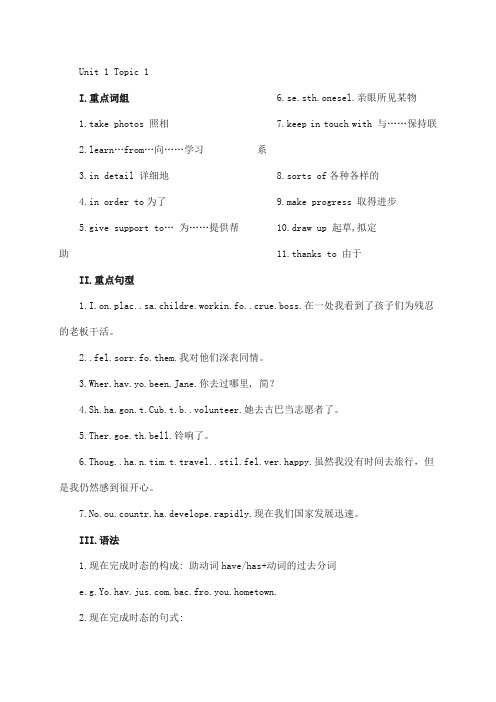
Unit 1 Topic 1I.重点词组1.take photos 照相2.learn…from…向……学习3.in detail 详细地4.in order to为了5.give support to…为……提供帮助6.se.sth.onesel.亲眼所见某物7.keep in touch with 与……保持联系8.sorts of各种各样的9.make progress 取得进步10.draw up 起草,拟定11.thanks to 由于II.重点句型1.I.on.plac..sa.childre.workin.fo..crue.boss.在一处我看到了孩子们为残忍的老板干活。
2..fel.sorr.fo.them.我对他们深表同情。
3.Wher.hav.yo.been.Jane.你去过哪里, 简?4.Sh.ha.gon.t.Cub.t.b..volunteer.她去古巴当志愿者了。
5.Ther.goe.th.bell.铃响了。
6.Thoug..ha.n.tim.t.travel..stil.fel.ver.happy.虽然我没有时间去旅行,但是我仍然感到很开心。
7.No.ou.countr.ha.develope.rapidly.现在我们国家发展迅速。
III.语法1.现在完成时态的构成: 助动词have/has+动词的过去分词.bac.fro.you.hometown.2.现在完成时态的句式:e.g.(1..hav.bee.t.Moun.Huan.wit.m.parents.(2) I haven’t seen him for a long time.(3) Where have you been?(4.——Hav.yo.eve.cleane..room?.——Yes..have..No..haven’t.3.have.ha.been.have/ha.gon.的区别have/has been to sp.表示曾经到过某地—— have/has gone to sp.表示已经去了某地e.g.(1..hav.bee.t.Moun.Huan.wit.m.parents. .(2.Sh.ha.gon.t.Cub.t.b..vo lunteer.Unit 1 Topic 2I.重点词组1. get lost 迷路2. each other 彼此3.at least 至少4take place发生5because of 因为6.b.stric.wit.sb.对某人严格要求.7.carry out 实行8.be short of 缺乏9.take measures to do sth.采取措施做某事10.be known as…作为……而著名11.work well in doing…在……方面起作用12.a couple of 一些13keep up with赶上,跟上II.重点句型1.Hav.yo.foun.hi.yet.你已经找到他了吗?2.——.reall.hat.t.g.shopping.我的确讨厌购物。
九年级英语上重点知识点九年级上册英语知识点
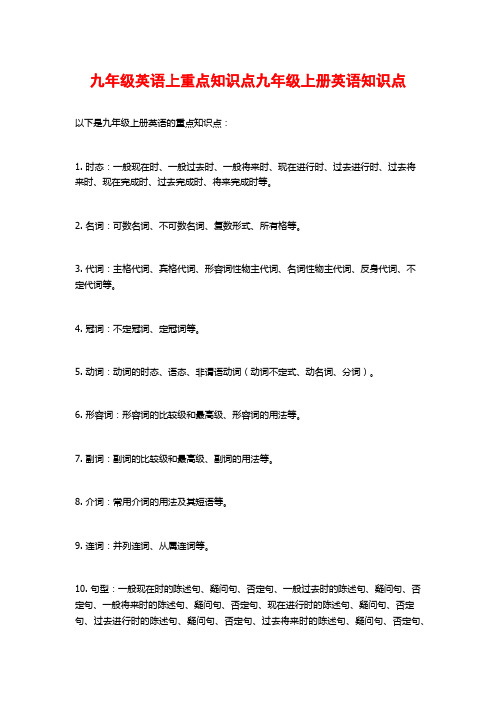
九年级英语上重点知识点九年级上册英语知识点
以下是九年级上册英语的重点知识点:
1. 时态:一般现在时、一般过去时、一般将来时、现在进行时、过去进行时、过去将
来时、现在完成时、过去完成时、将来完成时等。
2. 名词:可数名词、不可数名词、复数形式、所有格等。
3. 代词:主格代词、宾格代词、形容词性物主代词、名词性物主代词、反身代词、不
定代词等。
4. 冠词:不定冠词、定冠词等。
5. 动词:动词的时态、语态、非谓语动词(动词不定式、动名词、分词)。
6. 形容词:形容词的比较级和最高级、形容词的用法等。
7. 副词:副词的比较级和最高级、副词的用法等。
8. 介词:常用介词的用法及其短语等。
9. 连词:并列连词、从属连词等。
10. 句型:一般现在时的陈述句、疑问句、否定句、一般过去时的陈述句、疑问句、否定句、一般将来时的陈述句、疑问句、否定句、现在进行时的陈述句、疑问句、否定句、过去进行时的陈述句、疑问句、否定句、过去将来时的陈述句、疑问句、否定句、
现在完成时的陈述句、疑问句、否定句、过去完成时的陈述句、疑问句、否定句、将来完成时的陈述句、疑问句、否定句等。
以上是九年级上册英语的重点知识点,希望对你有帮助!。
九年级上册英语第一单元知识点

九年级上册英语第一单元知识点第一单元是九年级上册英语的开篇单元,主要介绍了一些基础的英语知识点。
下面是对该单元的知识点进行详细解析。
1. 重点词汇和短语在这一单元中,我们需要掌握一些重要的词汇和短语。
例如:- greet:问候- introduce:介绍- classmate:同学- subject:科目- foreign:外国的- born:出生- age:年龄- nationality:国籍- speak:说话- speak English:说英语- surprise:惊讶- lucky:幸运的- guess:猜这些词汇和短语在日常英语中经常使用,掌握它们有助于提高我们的英语交流能力。
2. 问候和自我介绍这一单元还涉及到如何进行问候和自我介绍。
例如,我们学习了一些常用的问候语,如:- How are you?:你好吗?- Good morning/afternoon/evening:早上/下午/晚上好- Nice to meet you:很高兴见到你在自我介绍方面,我们需要能够介绍自己的名字、年龄、国籍等信息。
例如:- My name is Tom.:我的名字叫汤姆。
- I'm thirteen years old.:我今年十三岁。
- I'm from China.:我来自中国。
通过学习这些知识点,我们可以在日常生活中更加自如地与他人交流。
3. 数字和年龄在这一单元中,我们还需要掌握数字和年龄的表达方式。
例如,我们需要学习1-20的英文表达形式:- one:一- two:二- three:三- ...- twenty:二十此外,我们还需要学会询问他人的年龄以及回答这个问题。
例如:- How old are you?:你几岁了?- I'm fifteen years old.:我十五岁。
数字和年龄是我们生活中经常用到的概念,掌握它们对我们的英语学习非常重要。
4. 国籍和语言在这个单元,我们还学习了如何询问他人的国籍以及使用的语言。
初三英语上册知识归纳

初三英语上册知识归纳
1. 词汇:
扩大词汇量:学习并掌握课本中的新词汇,同时通过阅读、听力等方式增加课外词汇量。
词性理解:理解并掌握名词、动词、形容词、副词等词性的基本概念和用法。
同义词和反义词:学习并掌握一些常用词汇的同义词和反义词,丰富语言表达。
2. 语法:
时态:学习并掌握一般现在时、一般过去时、一般将来时、现在进行时、过去进行时、现在完成时等时态的基本概念和用法。
语态:了解并掌握主动语态和被动语态的区别和用法。
直接引语和间接引语:学习如何将直接引语转换为间接引语,反之亦然。
定语从句和名词性从句:了解并掌握定语从句和名词性从句的基本结构和用法。
3. 句型:
简单句、并列句和复合句:了解并掌握这三种句型的基本结构和用法,能够识别并运用它们进行表达。
强调句和倒装句:学习并掌握强调句和倒装句的基本用法,丰富句型变化。
4. 阅读理解:
提高阅读速度:通过大量阅读,提高阅读速度和理解能力。
理解文章结构:学会分析文章的结构,找出主题句和关键信息。
猜测词义:学会通过上下文猜测生词的意思,提高阅读理解能力。
5. 写作:
写作技巧:学习并掌握一些基本的写作技巧,如分段、使用过渡词等。
写作练习:通过写作练习,提高写作能力,学会用英语表达自己的观点和想法。
九年级上册英语知识点

九年级上册英语知识点要把学九年上册英知看作一个体力活,要尽可能多地去接触英资料,不论是听的、的、写的和的,接触的多了,践的多了,英水平自然也会不停提升。
下边是小大家精心整理的九年英上册知点,供参照。
九年上册英知点1-2元Unit 1一:知点2.By: ①通⋯..方式 (门路 )。
例: I learn English by listening to tapes.②在⋯..旁。
例: by the window/the door③乘坐交通工具例: by bus/car④在⋯⋯从前,到⋯⋯止。
例: by October 在 10 月前⑤被例: English is spoken by many people.3.how 与 what 的区:how 往常方式或程度提,意思有:怎么如何,往常用来做状、表。
what 往常作的出者或接受者提,意思什么,往常做,主。
How is your summer holiday? It’s OK.(how 表示程度做表)How did you travel around the world? I travel by air.What do you learn at school? I learn English, math and many othersubjects.4.aloud, loud ,loudly 均可做副。
aloud 作声地大声地多与read、speak用比如: read aloud 朗 speak aloud作声来loud 大声地响亮地l oudly 大声地多指喧声和不动听的声音。
5.voice 指人的嗓音也指。
sound 指人能够听到的各样声音。
noise 指噪音、吵声6.find ++(名形容介短分等 )例: I find him friendly. I found him working in the garden.We found him in bed. He found the window closed.7.常的系有:①是: am 、is、 are ②保持: keep、 stay③:become、 get、 turn ④ ⋯⋯起来 feel、 look、 smell、taste、 sound8.get ++(形容去分不定式 ) 使某种情况生例:Get the shoes clean.把鞋擦干Get Mr. Green to come. 格林先生来I want to get my bike repaired. 我想去修自行You can’tget him waiting. 你不可以他老等着9.不定式做定①与所修的名组成主关系The next train to arrive was from New York. He is always the first to come.②与所修的名组成关系I have nothing to say. I need a pen to write with.I need some paper to write on. I don’thave a room to live in.10. practice , fun 做名不行数名11. add 充又12. join 加入某体并成此中一attend 列席参加会或座join in 与 take part in 指参加到某活中去。
九年级上册英语知识点归纳

九年级上册英语知识点归纳一、语法知识点1. 一般现在时:用于表达经常性、习惯性的动作、真理和客观事实。
例如:She often goes to the park on weekends.2. 一般过去时:用于过去某个时间发生的动作或状态。
例如:I visited my grandparents last summer.3. 现在进行时:表示此刻正在进行或发生的动作,常与now, at the moment连用。
例如:They are playing basketball in the park.4. 现在完成时:表示过去发生的动作对现在造成的影响或结果。
例如:I have finished my homework.5. 一般将来时:表示将要发生的动作或存在的状态。
例如:We will go swimming tomorrow.6. 时态的转换:根据上下文和语境进行时态转换,包括变换动词的时态和代词的时态。
7. 名词所有格:用来表示某物或某人所拥有的东西或关系。
例如:Tom's book is on the desk.8. 形容词比较级和最高级:用于比较两个或多个事物之间的差异。
例如:This book is more interesting than that one.9. 副词的比较级和最高级:用于比较两个或多个动作或状态的程度。
例如:He runs faster than his brother.10. 反意疑问句:用于表示询问对方是否同意或不同意的附加疑问句。
例如:You like this movie, don't you?11. 特殊疑问句:用于询问特定信息的疑问句,如what, who, when, where, why, how等。
例如:Where did you go on vacation?二、单词和词组知识点1. 单词拼写:掌握常见单词的正确拼写和用法。
2. 动词短语:熟练掌握常见的动词短语,如look forward to, take care of, get along with等。
九年级上册英语一至三单元知识点总结
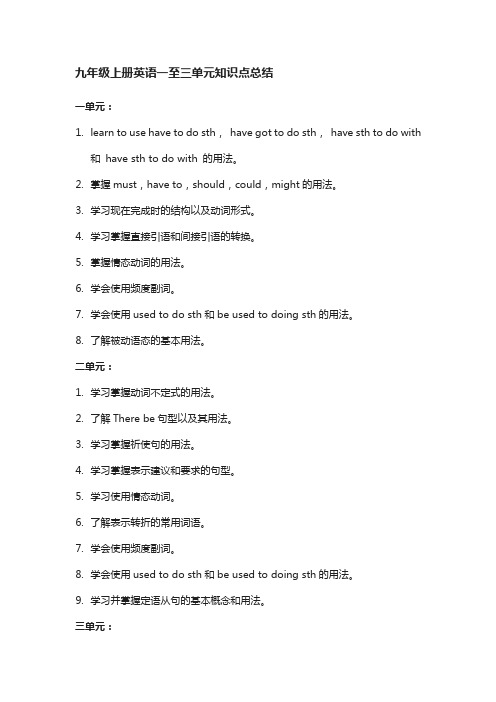
九年级上册英语一至三单元知识点总结
一单元:
1.learn to use have to do sth,have got to do sth,have sth to do with
和have sth to do with 的用法。
2.掌握must,have to,should,could,might的用法。
3.学习现在完成时的结构以及动词形式。
4.学习掌握直接引语和间接引语的转换。
5.掌握情态动词的用法。
6.学会使用频度副词。
7.学会使用used to do sth和be used to doing sth的用法。
8.了解被动语态的基本用法。
二单元:
1.学习掌握动词不定式的用法。
2.了解There be句型以及其用法。
3.学习掌握祈使句的用法。
4.学习掌握表示建议和要求的句型。
5.学习使用情态动词。
6.了解表示转折的常用词语。
7.学会使用频度副词。
8.学会使用used to do sth和be used to doing sth的用法。
9.学习并掌握定语从句的基本概念和用法。
三单元:
1.学习掌握过去进行时的用法。
2.学习掌握过去完成时的用法。
3.学习掌握现在完成进行时的用法。
4.学习掌握现在完成时的被动语态用法。
5.学习掌握情态动词的完成式用法。
九年级上册英语的知识点

九年级上册英语的知识点知识比钱更挑剔,知识的流动比钱更偶然更深层,有质量的知识都是整体流动的,下面小编给大家分享一些九年级上册英语的知识,希望能够帮助大家,欢迎阅读!九年级上册英语的知识1一.短语归纳1.dance to (music) 随着(音乐)跳舞2.sing along with 随着…一起唱3. musicians who play different kindsofmusic弹奏不同类型音乐的音乐家4. electronic music 电子音乐5. not much 没什么(事)6. suppose sb to do sth. 猜想某人做某事7. be supposed to do sth 应该做某事8. suppose sb (to be) +adj. 原以为…9. have spare time 有空闲时间10. in one’s spare time在某人的空闲时间11. spare the time to do sth 抽时间做…12. a film director 一名电影导演13. think too much 想太多14. in that case 既然那样15. World War II 第二次世界大战16. smooth music 悦耳的音乐17. prefer A to B 比起B来更喜欢A18. prefer doing A to doing B19. prefer to do sth. rather than do sth.20. feel like doing sth 想要做某事21. stick to 坚持,固守22. be down 悲哀,沮丧23. cheer sb up 使… 高兴/ 振奋24. have a happy ending 有个美满的结局25. try one’s best to do sth. 尽某人最大努力做…26. less serious 不那么严重27. a good way to do sth 做某事的好办法28. make me feel even sadder 让我感觉更伤心29. provide plenty of information about a certain subject 提供了大量的关于某个主题的信息30. shut off my brain 关闭我的大脑31. in time 及时on time 按时/准时32. once in a while 偶尔的,有时33.write one’s own lyrics 自己写歌词34.sing the words clearly歌词唱的清楚35. take sb to sw.带某人去某地36. Chinese folk music 中国民间音乐37.be played on the erhu 由二胡演奏的38 move sb.感动某人, sb. be moved by…39. strangely beautiful 异常的/出奇的美40. sense a strong sadness and pain 感觉到一种强烈的伤感和痛苦41.one of the most moving pieces of mus 最令人感动的乐曲之一42. look up 查看,查阅43. be written by sb. 由/ 被…写的44. in the city of… 在…市45. play many musical instruments 弹奏很多的乐器46. by age 17 到17岁的时候47. be known for musical ability 因音乐才能而出名48. develop a serious illness 得了一种很重的病49. become blind 成了盲人,变瞎50. for several years 几年51. make money 赚钱52. get married (to sb) (和某人)结婚53. continue to do sth. 继续做某事54. perform in this way用这种形式表演55. during/ in one’s lifetime在某人有生之年56. by the end of… 到…末为止57. It’s a pity that… … 遗憾的是…58. in total 总共59. be recorded for the future worldtohear 被记录下来供后人聆听60. the great erhu masters 很棒的二胡大师61. master a foreign language 掌握一门外语62. praise …for… 因为…赞美63. China’s national treasures中国的国家珍宝64. paint a picture of…描绘了一幅…画65. recall one’s deepestwounds 唤起某人最深的伤痛66. painful experiences 痛苦的经历67. a time for spreading joy 传播快乐的时间九年级上册英语的知识2一.短语归纳1.gethis driver’s license 取得驾驶执照2.noway没门,不行3.sixteen-year-olds 十六岁的人sixteen-year-old十六岁的4. be worried about=worry about 担5. have part-time jobs 做兼职工作6. get one’s ears pierced 打耳洞7. get / have / make sth. done 使某物被做……8. stop doing sth 停止做某事9. stop to do sth. 停下来去做某事10. spend time with sb. 花时间和某人在一起11.take photos, take a photo 照相e a flash 使用闪光灯13.all night 整夜14.stay by my side 呆在我身边15.make sure = be sure 确保,确定16.keep sb. (away) from sth使某人远离某物17. hurt oneself 伤害某人自己18. give sb. a hug = hug sb. 拥抱某人19.lift sb.up 举起某人20. cough badly 剧烈地咳嗽21. talk back 回嘴22. an adult 一个成人23. think back to 回想起24. regret doing sth. 后悔做了某事25. make one’s own decision 做某人自己的觉得26.too + adj.+ to do sth. 太…而不能做某事27.learn…from…从…学到…28.agree with sb 同意某人的观点29.disagree with sb. 不同意某人的观点30.move out 搬出去31.take care of = look after=care for 照顾32.manage one’s own life 管理自己的生活33.manage to do sth 努力完成某事34. that is why 那就是为什么…35.continue to do sth继续做某事36. take a test参加考试37.pass the test通过考试38.fail the test考试不及格39.be strict with sb in sth在某方面对某人要求严格40.get in the way of妨碍…41.a running star一个跑步明星42.a professional runner一个专业的跑步运动员43.grow up长大44.allow sb. to do sth.允许某人做某人45.should be allowed to do sth. 应该被允许去做某事46.have nothing against doing sth.不反对做某事47.succeed in doing sth.成功做某事48.fail to do sth. 做某事失败49.end up with 以…结束 end upas 最终成为50.practice doing sth.练习做某事51.see sb. do sth. 看见某人做了某事52.spend time on sth.在某事上花时间spend time in doing sth在做某事上花时间53. care about sb.关心某人54.talk with sb. about sth.和某人谈论某事55.make a choice做选择56.have a chance to do sth.有机会去做某事二.用法集萃1.She is a sixteen-year-oldgirl.=She is sixteen years old.2. allow sb. to do sth. 允许某人做某事(主动语态)be allowed to do sth. 被允许做某事(被动语态)Mother allows me to watch TV every night.LiLy is allowed to go to America.3. get their ears pierced 穿耳洞让/使(别人)做某事get sth. done(过去分词)have sth. doneI get my hair cut. == I have my hair cut.4. enough 足够形容词+enough 如:beautiful enough 足够漂亮enough+名词如:enoughfood 足够食物enough…to 足够…去做…例:I have enough money to go to Beijing. 我有足够的钱去北京。
九年级上册英语笔记知识点
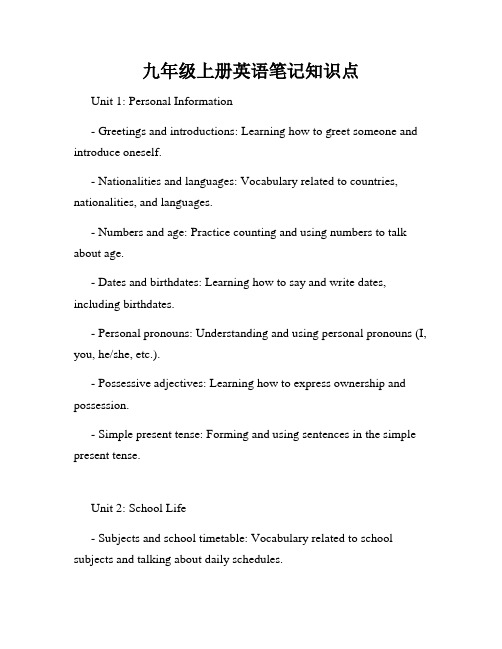
九年级上册英语笔记知识点Unit 1: Personal Information- Greetings and introductions: Learning how to greet someone and introduce oneself.- Nationalities and languages: Vocabulary related to countries, nationalities, and languages.- Numbers and age: Practice counting and using numbers to talk about age.- Dates and birthdates: Learning how to say and write dates, including birthdates.- Personal pronouns: Understanding and using personal pronouns (I, you, he/she, etc.).- Possessive adjectives: Learning how to express ownership and possession.- Simple present tense: Forming and using sentences in the simple present tense.Unit 2: School Life- Subjects and school timetable: Vocabulary related to school subjects and talking about daily schedules.- School facilities: Describing school facilities and locations within the school.- Classroom objects: Learning the names of commonly used objects in the classroom.- School rules: Understanding and discussing school rules and regulations.- Adverbs of frequency: Using adverbs to describe how often certain activities occur.- Present continuous tense: Forming and using sentences in the present continuous tense.Unit 3: Family and Relationships- Family members: Vocabulary related to different family members.- Describing family relationships: Using adjectives to describe family relationships.- Routines and daily activities: Talking about daily routines and activities within the family.- Giving directions: Learning how to give and follow directions.- Prepositions of place: Understanding and using prepositions to describe the location of objects.- Imperatives: Forming and using imperative sentences to give commands or instructions.Unit 4: Hobbies and Leisure Activities- Leisure activities: Vocabulary related to different hobbies and leisure activities.- Likes and dislikes: Expressing preferences and talking about what one enjoys or dislikes.- Adjectives to describe activities: Learning descriptive adjectives used to talk about hobbies.- Asking and answering questions: Practicing question forms to inquire about others' hobbies.- Present simple vs. present continuous: Understanding the difference between the two tenses in relation to hobbies.Unit 5: Living in the City- City landmarks: Vocabulary related to famous landmarks in cities.- Describing cities: Using adjectives to describe cities and their characteristics.- Transportation: Vocabulary related to different modes of transportation in the city.- Asking for and giving directions: Practicing dialogue for asking and giving directions in the city.- Expressing opinions: Learning phrases to express personal opinions about cities.- Comparative and superlative forms: Understanding the different forms used for making comparisons.Unit 6: Food and Health- Food vocabulary: Vocabulary related to different types of food and beverages.- Healthy lifestyle: Discussing the importance of a healthy lifestyle and balanced diet.- Likes, dislikes, and preferences: Expressing personal preferences regarding food.- Discussing meals: Learning how to describe different meals and eating habits.- Modal verbs: Introduction to modal verbs such as can, should, must, etc.- Giving advice: Practicing giving and receiving advice related to healthy eating.Unit 7: Technology and Social Media- Technology devices: Vocabulary related to different technological devices.- Social media platforms: Learning about different social media platforms and their uses.- Digital citizenship: Understanding the importance of responsible and safe online behavior.- Internet safety: Discussing ways to stay safe while using the internet and social media.- Present perfect tense: Forming and using sentences in the present perfect tense.- Writing emails and messages: Practicing writing emails and messages in English.Unit 8: Environmental Issues- Environmental vocabulary: Vocabulary related to environmental issues and concerns.- Recycling and conservation: Discussing the importance of recycling and conservation.- Climate change: Understanding the concept of climate change and its impact.- Expressing opinions and suggestions: Speaking about environmental issues and suggesting solutions.- Passive voice: Introduction to the passive voice and its usage in sentences.- Writing reports: Practicing writing reports on environmental topics.Unit 9: Careers and Future Plans- Jobs and professions: Vocabulary related to different jobs and professions.- Talking about future plans: Expressing ideas and aspirations for future careers.- Education and qualifications: Discussing educational paths and qualifications required for specific careers.- Comparative adjectives: Using comparative adjectives to compare different job positions.- Conditional sentences: Introduction to conditional sentences (If...then...) to talk about hypothetical situations.- Interview skills: Learning and practicing interview skills for job interviews.Unit 10: Celebrations and Traditions- Celebrations around the world: Learning about different celebrations and traditions in various cultures.- Festivals and holidays: Vocabulary related to different festivals and holidays.- Describing traditions: Using adjectives and phrases to describe cultural traditions.- Invitations and responses: Practicing inviting others and responding to invitations.- Future tense: Forming and using sentences in the future tense.- Writing invitations and letters: Practicing writing invitations and letters for different occasions.Note: This article serves as an outline for the knowledge points covered in the English textbook for the ninth-grade students. Each unit introduces specific vocabulary, grammar structures, and language skills. Students are encouraged to actively participate in class activities and practice using English in various contexts to enhance their language proficiency.。
人教版九年级上英语知识点

人教版九年级上英语知识点一、语法知识点在人教版九年级上英语课程中,学生将学习到以下几个重要的语法知识点:1. 时态和语态时态和语态是英语语法中的重要部分。
九年级上册将进一步学习和巩固现在完成时、一般过去时、一般现在时、被动语态等时态和语态的用法。
2. 直接和间接引语九年级上册将学习如何将直接引语转换为间接引语,并学习相应的语法规则和变换方式。
3. 倒装句倒装句是英语语法中一种常见的句型结构。
九年级上册将学习倒装句的用法,包括完全倒装和部分倒装。
4. 虚拟语气九年级上册将介绍虚拟语气的用法,包括与现在事实相反、与过去事实相反、与将来事实相反等情况下的虚拟语气的表达方式。
二、词汇和词组在九年级上册的英语学习中,学生将学习到大量的新词汇和词组,包括但不限于以下几个方面:1. 名词学习和掌握名词的单复数形式、所有格和可数与不可数名词的用法。
2. 动词学习和掌握动词的不同形式,包括过去式、现在分词和过去分词的用法。
3. 形容词和副词学习和掌握形容词和副词的比较级和最高级形式,以及其在句子中的使用方法。
4. 介词短语学习和掌握常见的介词短语的用法,包括表示时间、地点、原因、目的等方面的介词短语。
5. 重要短语和例句学习和记忆一些常用的短语和例句,以帮助理解和运用英语的基本语言表达。
三、阅读和写作技巧九年级上册英语课程还将注重培养学生的阅读和写作技巧。
以下是一些相关的技巧和要点:1. 阅读理解学习如何通过阅读理解题目,提取关键信息,理解文章的主旨和细节。
2. 写作技巧学习如何写作不同类型的文章,例如书信、日记、应用文等,掌握常用的写作句型和表达方式。
3. 衔接词语学习和使用适当的衔接词语,使文章的逻辑关系更加明确和流畅。
4. 语言风格学习如何选择适当的语言风格,例如正式语言和非正式语言,在不同的语境中使用合适的语言表达方式。
九年级上册英语知识点的学习将帮助学生进一步提高英语综合运用能力,为日后的学习和应用打下坚实的基础。
- 1、下载文档前请自行甄别文档内容的完整性,平台不提供额外的编辑、内容补充、找答案等附加服务。
- 2、"仅部分预览"的文档,不可在线预览部分如存在完整性等问题,可反馈申请退款(可完整预览的文档不适用该条件!)。
- 3、如文档侵犯您的权益,请联系客服反馈,我们会尽快为您处理(人工客服工作时间:9:00-18:30)。
Please remember to turn off the light when you leave.
离开时请记得关好灯。
2. 不定式作宾语时,如带有宾语补足语,则要把不定式放到后面,用it作形式宾语,构成“主语+动词+it+宾补(形容词、名词)+不定式”结构。
如:He found it very difficult to get to sleep.
他发现很难入睡。
四. 动词不定式作宾语补足语
1. 后面能接to不定式作宾语补足语的动词有:ask order teach tell want wish help等。
The teacher told us to do Exercise 1. 老师要我们做练习一。
I want both of you to go. 我要你们俩去。
We helped her (to) repair her bike. 我们帮助她修理自行车。
2. 使役动词let have make及感官动词see watch notice hear feel等要以不带to的不定式作宾补。
Let’s have a rest. 我们休息一会吧。
I saw him come in. 我看见他进来了。
感官动词后既可跟不带to的不定式作宾补,也可跟v-ing作宾补,前者表示动作的全部过程已结束;后者表示动作正在进行。
I saw him come downstairs.我看见他下了楼。
(说明他下楼了这件事)
I saw him coming downstairs.我看见他在下楼。
(说明他下楼时的情景)
五. 动词不定式作状语
Later he left home to work in different cities. 不久他离开家到不同的城市工作。
He went to see a football match. 他去看足球比赛了。
In order to catch the other students I must work hard.
为了赶上其他同学,我必须努力学习。
六. 动词不定式作定语
不定式作定语一般放在所修饰的词的后面。
I need something to eat.
Do you have something to read?
Tom was so excited that he had no word to say.
He is really a fool only to eat.
The man to stand here just now is our English teacher.
The doctor had no way to save the patient.
注意:
(1)作定语的不定式是由及物动词组成,被修饰的名词或代词与不定式之间存在方位或方式关系需要有介词。
I am looking for a room to live in. 我正在找一间住房。
(方位关系)
We have many things to do experiments with.
我们有许多做实验的东西(方式关系)
(2)作定语的不定式是由“be + adj + prep”构成的动词短语。
Here there isn’t any book for me to be interested in.
We have done many things to proud of. 我们做了许多引以自豪的事。
七. 动词不定式作主语
To give is better than to receive.
To reach there on foot is impossible.
动词不定式作主语时,可以用it 代替,把实际主语不定式放在后面。
It’s better to give than to receive.
It’s impossible to reach there on foot.
It’s + adj + for sb. to do sth.
It’s not difficult for me to study English well.
It’s easy for him to work out this math problem.
在这个句型中,如果形容词与不定式的逻辑主语关系密切,并且形容词用来说明逻辑主语的性质、品质、特点等,由of引出逻辑主语。
这类形容词主要有nice kind good wrong right 等。
八. 动词不定式和疑问词连用
动词不定式可以和疑问词what which how where when连用,构成不定式短语,可以作主语、宾语、表语、宾语补足语等。
How to do is still a question.
Have you decided when to leave?
九. 动词不定式的否定形式
动词不定式的否定式是在to前加not;不带to的不定式则在动词前加not. 如:
Zhang Ming asked me not to stay at home all day. 张明要我不要整天呆在家里。
My mother let me not do it by myself. 妈妈让我不要独自做这件事。
被动语态
英语有两种语态:主动语态和被动语态
主动语态(The Active Voice)表示主语是动作的执行者。
被动语态(The Passive Voice)表示主语是动作的承受者。
构成:承受者+助动词be+及物动词的过去分词+by+执行者
一般现在时:承受者+助动词am / is/are +及物动词的过去分词+by+执行者
一般过去时:承受者+助动词was / were +及物动词的过去分词+by+执行者
承受者+助动词shall / will be+及物动词的过去分词+by+执行者
承受者+助动词 have/ has been+及物动词的过去分词+by+执行者
承受者+ can /may/must/should +be+及物动词的过去分词+by+执行者
被动语态用法:
1)当我们不知道动作的执行者是谁,或者没有必要指出动作的执行者时,需用被动语态。
2)当我们需要强调动作的承受者时常用被动语态。
3)如果需要说出动作的执行者用by引导出动作的执行者。
主动语态变为被动语态时,其谓语动词的时态要与原句时态保持一致,其谓语动词的数要与新主语保持一致。
主动语态变为被动语态时有以下几种情况:
1)主语+谓语动词+宾语
将主动语态的宾语变为被动语态的主语。
(主动)We bought a book yesterday.
(被动)The book was bought yesterday.
2)主语+谓语动词+间接宾语+直接宾语
将主动语态中一个宾语变为被动语态的主语。
多数情况下将间接宾语变为主语。
如果直接宾语变为主语时,间接宾语前要加介词to / for。
(主动)He showed me a book yesterday.
(被动)I was showed a book yesterday.
(被动)The book was showed to me yesterday.
3)主语+谓语动词+复合宾语
含有一个由宾语加宾语补足语构成的复合宾语,变为被动语态时,将主动语态的宾语变为被动语态的主语,宾语补足语保留不变,成为主语补足语。
(主动)I found him a good pupil. (宾语补足语)
(被动)He was found a good pupil. (主语补足语)
4)短语动词变为被动语态
有些短语动词相当于一个及物动词,其后可以接宾语,因此它们也有被动语态,但短语动词是不可分割的整体,变为被动语态时不可去掉其后面的介词或副词。
(主动)We should look after the patients very well.
(被动)The patients should be looked after very well by us.
5)宾语从句变为被动语态
若主动语态中是宾语从句,变为被动语态时常用it作形式主语,而把真正的主语放在后面。
It’s said that he passed the exam.
被动语态应注意的几个特殊问题:
(1)不及物动词带介词和介词宾语,在变为被动语态时,仍然要带上介词。
(主动)The students in class listen to the teacher carefully.
(被动)The teacher is listened to carefully by the students in class.
(2)当动词带有复合宾语时,并且宾补是省去“to”的动词不定式时,在被动语态中应加上“to”。
(主动)They make do all the work.
(被动)We were made to do all the work.
(主动)We often hear her sing English songs.
(被动)She is often heard to sing English songs.(主动)I see him walk to school.
(被动)He is seen to walk to school.。
